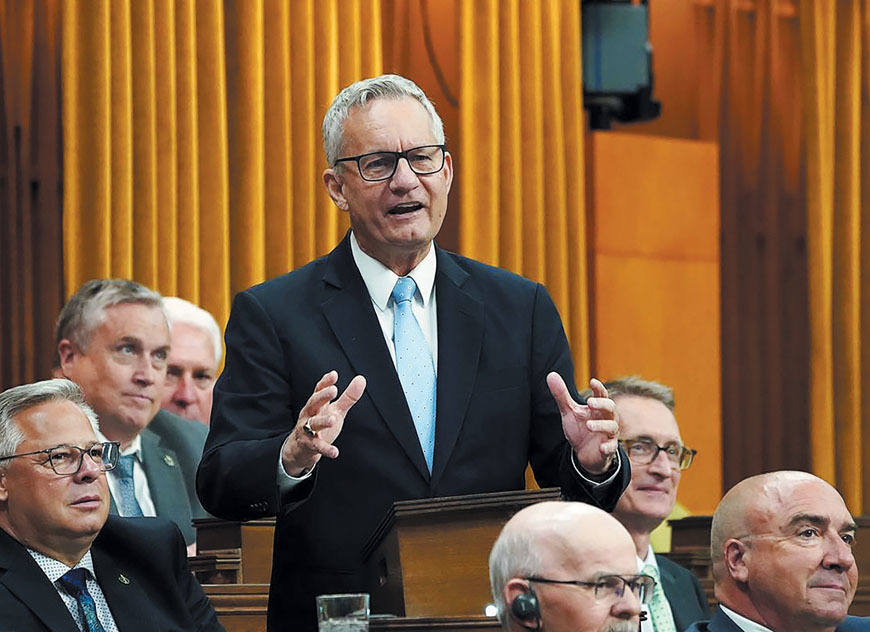A Liberal and a Conservative both argue against privatizing beliefs

"Faith is not a component of my life. It’s just my life. I don’t separate them.”
That’s how John McKay, Liberal Member of Parliament for Scarborough-Guildwood, describes how his Christian faith impacted his work as a politician for the past 23 years.
“Whatever I do in politics, I do it as a reflection of my faith,” said McKay, 76, who will retire when the next federal election is called in 2025.
Over his 23 years as an MP, McKay, part of The People’s Church with his wife Carolyn Dartnell, has seen changes in Canada. “We are firmly moving into a post-Christian, post-religious country,” he says.
 Liberal MP John McKay represents Scarborough-Guildwood in Ontario.
Liberal MP John McKay represents Scarborough-Guildwood in Ontario.
One of the things pushing the country in that direction is the merger between right-wing politics and Evangelicals in the U.S. – a development that saddens him.
“The evangelical church in the U.S. has done more to diminish the gospel of Christ than pretty much any other organization,” McKay says.
Of his time in Parliament, McKay looks back with satisfaction on three significant pieces of legislation he proposed, all private member’s bills approved by the House.
It was pretty hard to argue against making aid more effective and against making sure aid gets to people who need it most. The first was C-260, passed in 2003, that requires cigarette manufacturers to produce “fire-safe” cigarettes that extinguish when left unattended, reducing their flammability.
"When is the last time you heard of a house burning down because of unsafe smoking?” he asks, noting that for years manufacturers knew how to make a safer cigarette.
The second, C-293, The Development Assistance Accountability Act, is also known as the “better aid bill.” Passed in 2008, it requires the Canadian government to be sure foreign aid is tightly targeted toward the goal of poverty reduction, and also requires the government to report in a timely and transparent way about how the aid money was spent.
“It was pretty hard to argue against making aid more effective and against making sure aid gets to people who need it most,” he says of the bill, which was supported by aid groups like World Vision.
And he’s also proud of Bill C-423, The Modern Slavery Act, passed in 2023. It requires businesses to see if there is child labour or forced labour in their supply chains.
Since the bill’s passing about 40% of the 6,000 or so businesses that reported found some problems in their supply chains. “The problem was bigger than many thought it was,” he says.
In proposing the bill McKay was inspired by William Wilberforce, the Christian politician who led the charge to end the slave trade in Great Britain in 1807.
“The Bible is pretty clear about people having human dignity,” McKay says of his reason for proposing the Act.
Of his time in Parliament, he says, “It was a privilege to serve. I got to be one of 338 people who got to debate the issues of the day and try to make a difference.”
One thing McKay is clear about is that no person or party in Parliament is the sole occupant of the high ground on any issue. “I can say unequivocally that the Liberal Party does not have the corner on the truth, and all that is good and holy,” he says. “But neither does any other party.”
As for how his time in office will be judged, “I leave it to others to decide my reputation,” McKay says. “I just tried to run the race faithfully. I hope I ran it well.”

The Evangelical Fellowship of Canada’s Centre for Faith and Public Life maintains strategic relationships with MPs, senators and other officials using a reasoned and compassionate biblical voice. TheEFC.ca/CFPL
For Ed Fast, “Faith forms every aspect of my life."
Also retiring when the next election is called is Ed Fast, 69, who represents Abbotsford, B.C., for the Conservative Party of Canada.
“My faith forms every aspect of my life,” says Fast, an MP for 19 years. “Everything I have done as a politician is rooted in my faith values.”
For Fast, who attends Northview Community Church with his wife Annette, those values include honesty, integrity, love, peacemaking, compassion, promoting life and forgiveness.
Fast has seen big changes in his constituency over his almost two decades of serving as an MP. Once mainly a Mennonite city (Northview is a Mennonite Brethren congregation), today Abbotsford is home to a large southeast Asian population. “There are many more cultural dimensions to my work,” says Fast.
His community may have changed, but one thing that is the same for Fast is how he lives out his faith values as a politician.
“I believe people of faith have a role to play in politics, to bring their faith values to the table,” he says, noting people of many faith traditions can be found in Parliament today. “I encourage people of faith to run for office, to apply their faith in the decision-making process for the country.”
At the same time he laments the space for people of faith in Canadian society is narrowing, “especially for Christians” – a marginalization that will leave the country “impoverished.

“We live in a highly divisive environment, more divided than has ever been,” he says, suggesting people of faith can lead the effort to bring people together. “We need people of goodwill to discuss how we can live together in peace and harmony.”
Highlights of his time in Parliament include being chair of the standing committee on justice and human rights, and serving as international trade minister in Stephen Harper’s government. He is also proud of Bill C-277, his private member’s bill in 2007 that doubled the prison sentence from five years to ten years for child luring.
He also draws satisfaction from his efforts to push back on the expansion of assisted suicide for Canadians whose only condition is mental illness. In 2023 he sponsored Bill C-314, a private member’s bill that sought to amend the Criminal Code for medical assistance in dying (MAiD) by preventing a person from being eligible for MAiD on the basis of mental illness.
He also draws satisfaction from his efforts to push back on the expansion of assisted suicide for Canadians whose only condition is mental illness.
His amendment was defeated, but a final decision on whether to permit mental illness to be used for MAiD has been postponed beyond the initial one-year waiting period – a development he feels his efforts helped with.
For Fast, MAiD should have never been extended to people suffering solely from mental illness – a vulnerable group who should be offered help, not death, he says. “Those suffering from mental disorders, including depression, deserve mental health, and social support and counselling. They need to find some joy and some meaning in life.”
For Fast involvement in legislation about MAiD is consistent with his faith. “Having faith means wanting to protect life at all stages,” he says.
John Longhurst is a journalist at the Winnipeg Free Press and CanadianAffairs.news. Photo of Parliament: Nabil Saleh. Photo of John McKay courtesy of John McKay. Photo courtesy of Ed Fast, Abbotsford, B.C.